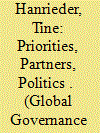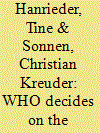| Srl | Item |
| 1 |
ID:
168413


|
|
|
|
|
| Summary/Abstract |
This article explores the professional construction of the space of Global Health. I argue that the growth of Global Health as a field of practice does not merely indicate an intensification of North-South intervention. It is also a professional project of reimporting lessons from the South to countries in the North. I focus on the emerging didactic regime for Global Health in US medical education and the deterritorialized “global” lessons that students are taught in poor countries. By rescaling these lessons to precarious settings at home, the space of Global Health is reterritorialized as a Global Medical South stretching into the United States, reinforcing the perception that health is not a right but a privilege. The analysis is based on a content analysis of university websites and didactic handbooks and a sample of sixty-four articles evaluating the education effects of study abroad experiences. It reveals an emerging canon of Global Health virtues and the construction of domestic scales for Global Health practices, which are based on ethnic and socioeconomic categories. This analysis of professional projects as spatial projects sheds new light on the geography of Global Health and of professional globalization more generally.
|
|
|
|
|
|
|
|
|
|
|
|
|
|
|
|
| 2 |
ID:
175395


|
|
|
|
|
| Summary/Abstract |
The World Health Organization (WHO) is once more asked to reinvent itself and become more effective. This essay discusses recurrent reform proposals directed at the WHO which, in different ways, ask it to find a strategic focus and thereby its niche in the crowded global health arena. Looking back at decades of reform endeavors at the WHO, it exposes the contradictions and unresolved normative conflicts with regard to the WHO’s priorities. Ultimately, the WHO’s effectiveness hinges on Member State support for public authority in global health, and thus the political commitment to protect it against capture by special interests.
|
|
|
|
|
|
|
|
|
|
|
|
|
|
|
|
| 3 |
ID:
134146


|
|
|
|
|
| Publication |
2014.
|
| Summary/Abstract |
This article analyses the emergency governance of international organizations by combining securitization theory with legal theory on the state of exception. Our main argument is that where issues are securitized as global threats, exceptionalism can emerge at the level of supranational bodies, endowing them with the decisionist authority to define emergencies and guide political responses. We theorize the 'emergency trap', which is triggered when the emergency powers of international organizations reduce the obstacles to, and increase the incentives for, the securitization of further issues. Based on the idea that the emergency trap functions as an institutional driver of securitization, we also highlight the importance of the constitutional containment of emergency competencies as an alternative to discursive desecuritization strategies. We illustrate this security-emergency dynamic in a case study of the recent empowerment of the World Health Organization (WHO) in the governance of global health emergencies. The article shows how WHO's exceptional response to the 2003 severe acute respiratory syndrome (SARS) crisis paved the way for an institutionalization of emergency powers within the organization and contributed to securitizing the 2009 swine influenza outbreak as a global pandemic. However, WHO's crisis governance has also triggered internal and external processes of constitutional contention.
|
|
|
|
|
|
|
|
|
|
|
|
|
|
|
|